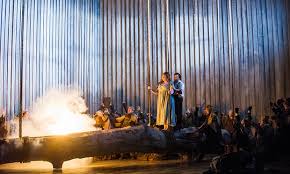London Coliseum, 17 February 2016
Christopher Alden has brought us Norma for the first time at ENO in its 85 years. In the same period we have had Joan Sutherland at Covent Garden and a memorable WNO production – so what has taken a masterpiece of this stature so long to surface? Perhaps it is simply the quality of the singers. The cast may be small in number but the demands are phenomenal, particularly for the protagonist.
Marjorie Owens certainly comes very close to the part. She may not (could anyone?) blot out the memory of Maria Callas in the role but her singing is ample and firm throughout, with no sense of terror at the range of tone needed. What she lacked on the first night was the fire and emotional range to take us fully along the roller-coaster of the narrative. Unusually for operas of the period Norma moves quite rapidly in its emotional challenges and the audience need to be fully engaged in these rather than simply watching them as outsiders. That this was not the case was obvious from a number of giggles across the stalls at key moments which should have been jaw-dropping.
None of this was the fault of the singers. Peter Auty made an heroic foil to Marjorie Owens’ Norma and was often thrilling at the top of the voice. Jennifer Holloway was a sympathetic Adalgisa yet had the weight of voice to match those around her. James Creswell, the only heavy voice on stage, brought an unexpected complexity to Oroveso as we watched his world unravel around him.
The chorus were magnificent throughout and their bitterness in the last act was compelling.
Stephen Lord has a fine reputation as a conductor of Bellini and showed his considerable talents in moving through the minefield of the score. Orchestral detail was secure and well-focused.
Christopher Alden has chosen to set the production in mid 19th century America, within a community of Druids who have separated themselves from the rest of society. In itself this is a perfectly reasonable premise and for much of the time – particularly in the second act – worked smoothly, allowing the relationships to flourish rather than the time scale detract. There were however some anomalies which would not go away. Oroveso is on stage throughout the first act. Are we to assume he simply ignores Norma’s children and is deaf to the conversations around him? And why do the Romans remain on stage during Casta Diva. The vast barn within which all the action takes place does provide a neutral space, forcing us to concentrate on the characters, but there is no sense of the natural world which is so regularly referred to – no moon, no sense of day or night. And then there is the tree trunk. As a visual image it is very striking and appropriate. As a raised area to be negotiated by the singers it becomes a problem as we are simply waiting for someone to fall off. The final flaming coup de theatre is impressive but it will interesting to see if the run gets to its end without accident.

